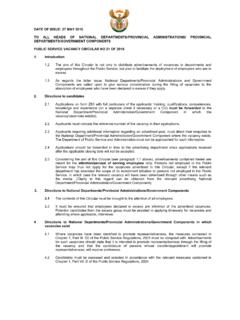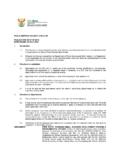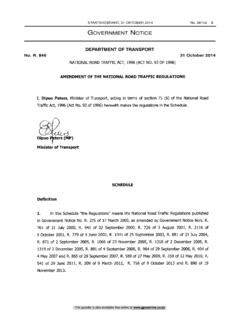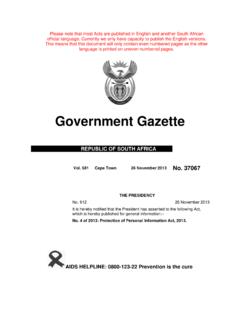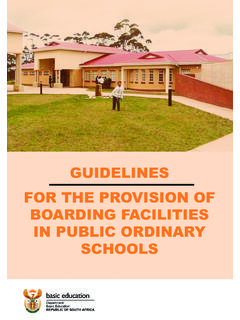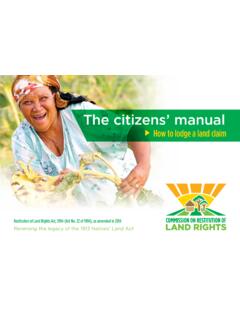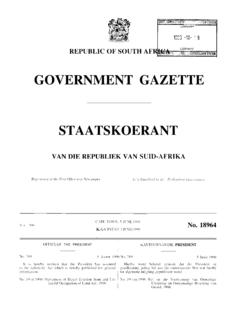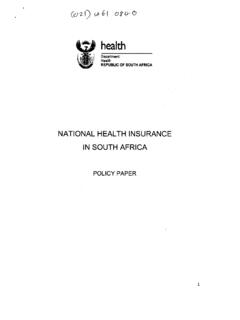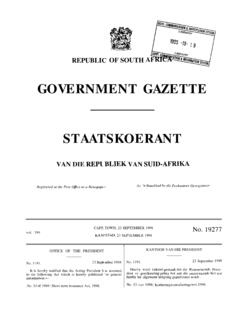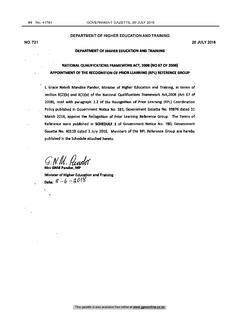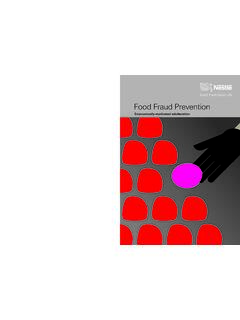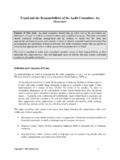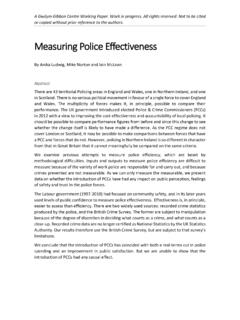Transcription of ! EK EE A / / /X A R R
1 Promoting GoodGovernance andAccountabilityLocal Government Anti-Corruption StrategyPromoting GoodGovernance andAccountability!EKKE//EAR/ARXiFOREWORD The initiative to promote good governance and accountability is premised on the principle that serving the public is fundamentally a means that the discipline and integrity required of those who serve the public as elected representatives or appointed administrators, is higher than that expected of other sectors in our society. The obligations of public office need honest and ingenuous accounting, but also require a commitment to democratic process. We who are entrusted with this privilege, should possess a strong sense of responsibility to act with efficiency and competence, and to discipline personal desires to the standards of law and democratic expectation.
2 We have a duty to frame judgements within the context of our constitutional values, yet shape them in response to legitimate public demands. We a have further obligation to seek outcomes that are respectful of the public, within the demands of the law, particularly since we are trustees of the public good in an environment dominated by private interests. As custodians of public institutions, we should attend to the long-term legitimacy of these institutions a legitimacy that is prone to erosion with every report of corruption or perception thereof. The strategy contained in this publication, seeks to reinforce our cognisance by providing practical guidance on the parameters that should be considered when executing the public's business with the express intent to promote good governance and accountability.
3 Such practical guidance should eliminate the so-called grey area that falls in between corruption and the perception of remain confident that this strategy and the guidelines contained herein, will serve as a useful tool for enhancing the public's confidence in our system of governance, and accord development and transformation a better chance for success. F S MUFAMADIMINISTER FOR PROVINCIAL AND LOCAL GOVERNMENTTERMS AND learned during the past five of the ON THE of Conduct for Councillors and Municipal , Policies and Systems, Policies and Management and and External and Information ON Induction Leave Procedures for Employees and Control over ON OTHER Representative of Provincial and Local African Local Government Channels for Unethical Conduct, fraud and AND Review of the StrategyTERMS AND ABBREVIATIONSACCCC onstitutiondplgLGACSLGMDALGTAL ocal GovernmentMFMAS tructures ActSystems ActSALGAU nethical conduct, fraud and corruptionAnti-Corruption Coordinating CommitteeThe Constitution of the Republic of South Africa.
4 1996 Department of Provincial and Local GovernmentLocal Government Anti-Corruption StrategyLocal Government: Municipal Demarcation Act, (Act No 27 of 1998)Local Government Transition Act,(Act No 209 of 1993)Includes category A, B, and C municipalities and municipal entitiesMunicipal Finance Management Act,(Act No 56 of 2003)Local Government: Municipal Structures Act, (Act No 117 of 1998)Local Government: Municipal Systems Act, (Act No 32 of 2000)South African Local Government AssociationIncludes, but is not limited to, the following legal definitions: fraud , the unlawful and intentional making of a misrepresentation resulting in actual or potential prejudice to another; Theft, the unlawful and intentional misappropriation of another's property or property which is in his/her lawful possession, with the intention to deprive the owner of its rights permanently; Offences in respect of corrupt activities as defined in the Prevention and Combating of Corrupt Activities Act, 2004, :vTERMS AND ABBREVIATIONSo The general offence of corruption which could be summarised as directly or indirectly accepting or agreeing to accept any gratification from another person.
5 Giving or agreeing to give any other person any gratification in order to influence that person directly or indirectly to exercise his powers, duties or legal obligations in a manner which is/amounts to:o Illegal, dishonest, unauthorised, incomplete, or biased;o Misuse or selling of information or material acquired;o Abuse of position of authority;o Breach of trust;o Violation of a legal duty or set of rules;o Designed to achieve an unjustified result; ando Any other unauthorised or improper inducement to do or not to do Corrupt activities in relation to: Public officials; Foreign public officials; Agents; Judicial officers; Members of the prosecuting authority; Unauthorised gratification received or offered by or to a party in an employment relationship; Witnesses and evidential material during certain proceedings; Contracts; Procuring and withdrawal of tenders; Auctions; Sporting events; and Gambling games or games of Conflicts of interests and other unacceptable conduct, : Acquisition of private interests in contract, agreement in or investment in public body; Unacceptable conduct relating to witnesses; and Intentional interference with, hindering or obstruction of investigation of AND ABBREVIATIONSo Other offences relating to corrupt activities, viz: Accessory to or after an offence.
6 Attempt, conspiracy and inducing another person to commit an offence; and Failure to report corrupt Irregularities relating to the following:oSystems issues: where a process/system exists which is prone to abuse by employees, the public or other stakeholders, : Procurement fraud , irregular collusion in the awarding of tenders or orders for goods and/or services; Deliberate non-compliance with delegation of authority limits; Collusion in contracts management; and Disclosing confidential or proprietary information to outside issues: where individuals or companies have fraudulently obtained money from Local Government, : Creditors fraud , diverting payments to incorrect creditors; Suppliers submitting invalid invoices or invoicing for work not done; Revenue fraud , irregular interception of payments received; Payroll fraud , creation of "ghost employees"; and Theft of and resource issues: where Local Government's equipment is utilised for personal benefit or stolen, : Theft of assets, computers, face value forms, etc; Personal use of resources, telephones, internet, e-mail; and Irregular destruction, removal, or abuse of records (including intellectual property).
7 ViiTERMS AND ABBREVIATIONSoOther issues: activities undertaken by employees of Local Government, which may be against policies or fall below established ethical standards, : Soliciting gifts or favours from consultants or other suppliers, acceptance of "kick-backs"; Conflicts of interest; Nepotism; Favouritism; and Deliberately omitting or refusing to report or act upon reports of any unethical conduct, fraud and Government is established as a sphere of government in terms of the Constitution of the Republic of South Africa. During the period of transition, which was launched by the promulgation of the Local Government Transition Act (Act No 209 of 1993) LGTA, Local Government has undergone a radical transformation. From a large number of inequitable and unsustainable institutions, 283 local authorities now exist as a result of the demarcation process and the Local Government elections of 5 December comprehensive policy and regulatory framework is now in place, the parameters of which are well described in the White Paper on Local Government (1998), supported by legislation, primarily in the form of the Local Government: Municipal Structures Act, (Act No 117 of 1998); Local Government: Municipal Systems Act, (Act No 32 of 2000); Local Government: Municipal Demarcation Act, (Act No 27 of 1998); Municipal Finance Management Act, (Act No 56 of 2003).
8 A number of national and provincial bodies have been established to support Local Government in the transformation and governance process. These include the representative body, the South African Local Government Association (SALGA) and its provincial affiliates, the Demarcation Board, the Local Government Sector Education and Training Authority and the South African Local Government Bargaining the policy framework, and to a large extent the institutional arrangements for good governance, are now in place, there is still a question about whether a sector-wide approach is actually being applied within Local Government. The process of decentralising powers and functions to Local Government is a complex and multi-faceted one, which INTRODUCTION requires that thought be given to the phasing and timing of implementation, as well as the capacity-building requirements that must be addressed in Local Government Anti-Corruption Strategy (LGACS) developed by thedplg is modelled around the Public Service Anti-Corruption Strategy but tailored to be applicable in Local Government.
9 The LGACS will undergo a process of refinement and integration with other existing initiatives during the implementation learned during the past five yearsProject Consolidate was initiated to assist identified municipalities in delivering on their mandate. Included in Project Consolidate is Local Government in the past year rolled out the Local Government Anti-Corruption Programme in five provinces, each represented by a sample of municipalities. The municipalities targeted by the programme are all designated Project Consolidate were a number of lessons learnt with regard to the readiness of municipalities to develop and implement anti-corruption measures. Most notable was that although some municipalities, especially the district municipalities and metropolitan municipalities, have anti-corruption and fraud policies and structures in place, those have proven to be inadequate to effectively fight corruption.
10 On the contrary, municipalities that service rural or economically under-developed areas do not have the required resources to establish anti-corruption structures and they respond to corruption and fraud matters on an ad hoc basis. The areas commonly identified or perceived as areas of great risk during the implementation of the programme, were the procurement process for building and allocation of RDP houses, overall lack of transparent 2 INTRODUCTION procurement processes, nepotism in employment of staff, inadequate financial controls and abuse of municipal assets. These common areas of concern have largely influenced the of the LGACST hemain principles upon which the LGACS is based are the following: Creating a culture within municipalities which is intolerant to unethical conduct, fraud and corruption; Strengthening community participation in the fight against corruption in municipalities; Strengthening relationships with key stakeholders, SALGA, employee representative unions and communities, that are necessary to support the actions required to fight corruption in municipalities; Deterrence of unethical conduct, fraud and corruption; Preventing unethical conduct, fraud and corruption which cannot be deterred; Detection of unethical conduct, fraud and corruption.
